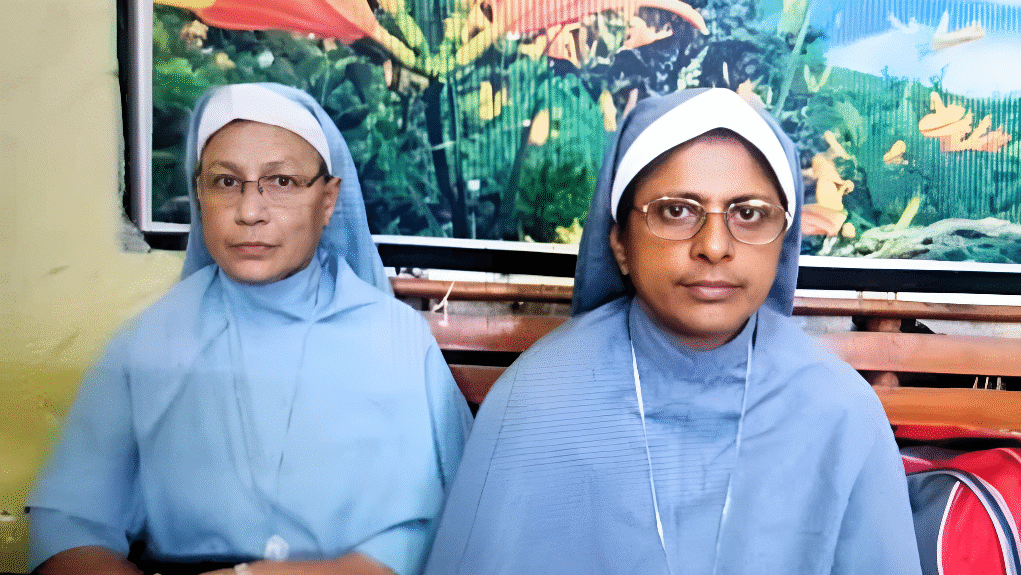Political uproar after arrest of two nuns and a tribal escort sparks national debate on religious freedom and minority rights
Raipur. The arrest of two Catholic nuns at Durg Railway Station in Chhattisgarh has triggered a nationwide political uproar. The incident, involving allegations of human trafficking and forced religious conversion, quickly escalated into a heated confrontation between the ruling party and the opposition.
Railway Station Incident
On 25 July 2025, activists of Bharatiya Janata Party-affiliated groups — Bajrang Dal and VHP — intercepted three tribal girls aged 18–19, from Narayanpur (Bastar), at Durg Railway Station. The girls were allegedly being taken to Fatima Hospital in Agra for promised employment (earning ₹8,000–10,000 per month plus other benefits) under the supervision of Sister Vandana Francis and Sister Preeti Mary.
The activists accused the nuns of orchestrating human trafficking and forced conversion. They detained the nuns and Sukman Mandavi, handing them over to the Railway Protection Force (RPF).
Legal Proceedings
The Durg GRP Police (Bhilai-3) registered a case under Section 4 of the Chhattisgarh Dharm Swatantrya Act and arrested all three individuals, sending them to 14 days of judicial custody. Police reports indicate that the girls had parental consent letters and valid documents, yet the case proceeded due to suspicion over conversion motives.
Political Reaction in Parliament
On 28 July, opposition MPs from the United Democratic Front and the Congress protested outside the Parliament. Congress leader K.C. Venugopal wrote to Home Minister Amit Shah and Chief Minister Vishnudev Sai, condemning the arrests. He stated that “the nuns were targeted by violent mobs without proof. This is an assault on religious freedom.”
In Lok Sabha, Rahul Gandhi described the incident as an example of “BJP-RSS mob rule,” calling it a systematic pattern of minority persecution. Priyanka Gandhi Vadra said the arrests were an attack on minority and women’s rights. CPI(M) leader Brinda Karat demanded a meeting with the Chief Minister but was denied access; she later visited the jail but could not meet the nuns.
On 27 July, a delegation of INDIA Alliance MPs — including Benyamin Baban, Francis George, N.K. Premchandran, Anil A. Thomas, Saptagiri Shankar Ulka, and Jareeta Laitphalang — visited Durg Central Jail and alleged obstruction by jail authorities. N.K. Premchandran vowed to raise the matter in Parliament and meet the Home Minister. Former Chief Minister Bhupesh Baghel also visited the jail and called the action illegal.
Voices from BJP and Other States
Kerala BJP President Rajeev Chandrasekhar criticized the Chhattisgarh police action, stating there was no evidence of forced conversion. He emphasized that the nuns were simply escorting girls for legitimate employment and said he supports their release. His remarks revealed internal dissent within BJP ranks. Chandrasekhar asserted that Bajrang Dal is independent and anyone violating laws must be punished.
Kerala Chief Minister Pinarayi Vijayan also wrote to Prime Minister Narendra Modi, demanding intervention and alleging obstruction of the nuns’ access to their relatives and legal counsel.
Chhattisgarh State Response
Chief Minister Vishnudev Sai defended the arrests, stating: “This is a case of human trafficking and forced conversion. The three tribal girls were being lured to Agra with job promises.” Home Minister Vijay Sharma affirmed the state government’s zero tolerance for conversion and assured impartial CBI investigation and legal consequences for the guilty.
Church and International Reactions
The Syro-Malabar Church and the Catholic Bishops’ Conference of India (CBCI) condemned the arrests as baseless and conspiratorial. The CBCI urged intervention by the Prime Minister and Home Minister, citing that the nuns had proper documentation and parental consent. Sr. Asha Paul alleged the girls were coerced into giving statements against the nuns.
International Christian Concern (ICC), a global religious freedom group, decried the Chhattisgarh incident on its website, calling it part of a larger pattern of religious minority persecution in India and demanded a thorough investigation.
Asia News, an international media outlet focused on religion and society, reported that the nuns were surrounded at the railway station, verbally abused, and their detention orchestrated under pressure to the railway police.
According to the Evangelical Fellowship of India (EFI), their 2024 report noted 840 incidents of violence against Christians nationwide, including 150 cases in Chhattisgarh.
Contextual Angle
Observers see this incident not only as a law-and-order issue but also as symptomatic of deeper socio-economic challenges in tribal regions like Bastar, where scarcity of local employment pushes youth — especially tribal girls — to seek work outside. Such dynamics often get entangled with communal sensitivities and political agendas, leading to wider fallout.















